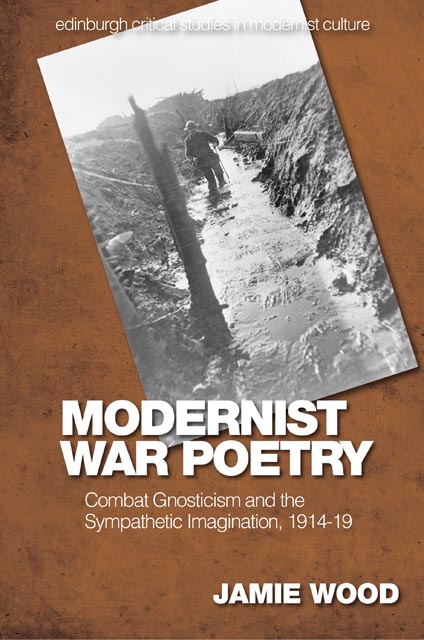Book contents
- Frontmatter
- Contents
- Timelines
- Acknowledgements
- Series Editors’ Preface
- Introduction
- 1 Early Modernist Responses to Combatant Poetry: 1914–Spring 1915
- 2 Reassessing Disaster: 1915
- 3 The Three Lives of Gnosticism: 1916–Summer 1917
- 4 An Emergent Critique of War Experience: Autumn 1917–Spring 1919
- 5 The Form and Practice of Modernist Distaste: Summer–Autumn 1919
- Conclusion
- Bibliography
- Index
- Frontmatter
- Contents
- Timelines
- Acknowledgements
- Series Editors’ Preface
- Introduction
- 1 Early Modernist Responses to Combatant Poetry: 1914–Spring 1915
- 2 Reassessing Disaster: 1915
- 3 The Three Lives of Gnosticism: 1916–Summer 1917
- 4 An Emergent Critique of War Experience: Autumn 1917–Spring 1919
- 5 The Form and Practice of Modernist Distaste: Summer–Autumn 1919
- Conclusion
- Bibliography
- Index
Summary
In 1929 T. S. Eliot told E. M. Forster that his analysis of The Waste Land had exaggerated the impact of the war. Eliot’s denial of that influence reflected a position the modernists nurtured from the beginning of the war in August 1914 through to the summer of 1919. There was no looking back. It was a position consolidated in A Survey of Modernist Poetry (1927) where ‘war-poetry’ became no more than ‘Georgianism’s second-wind’. There was no place for the genre at all in Principles of Literary Criticism (1924), just a single index entry, ‘Sentimental, and the war’, where the trope is introduced by I. A. Richards as ‘the pathetic and terrible change that can too often be observed in the sentiments entertained towards the War by men who suffered from it and hated it’. In New Bearings in English Poetry (1932) F. R. Leavis’s ‘“war-poets”’ are in scare quotes. W. B. Yeats’s ‘distaste’ of 1936, whilst infamous, was then somewhat belated and it has always seemed in any case a little contorted. It is hard to untangle from Yeats’s nationalism. It is also prey to both a potential misreading of the ‘passive suffering’ Yeats took from Matthew Arnold’s Empedocles on Etna ([1852]) and the accusation of hypocrisy given the terms on which Yeats rejected Sean O’Casey’s The Silver Tassie (1929). Eliot’s original position became for him a creed, evidenced by his Harvard lecture notes of 1933, the occasional poem ‘A Note on War Poetry’ (1942) and the essay ‘T. S. Eliot on Poetry in Wartime’ (1942). In these texts Eliot claimed that we need to distinguish between two types of poets: the real poet who finds himself thrown into war and the soldier who finds himself prone to poetry. Eliot remained unpersuaded that poetry could ever be written from within the experience of war.
Has Modernist War Poetry then followed Forster and exaggerated the importance of the war in the genealogy of modernist poetics? It has argued that the modernist long poem arose, in part, as a response to the arrival of the twentieth century’s moral witness, to the combatant’s absolute claim on the representation of an increasingly traumatic modernity, a claim epitomised by, but not exclusive to, the trench lyric.
- Type
- Chapter
- Information
- Modernist War PoetryCombat Gnosticism and the Sympathetic Imagination, 1914-19, pp. 214 - 220Publisher: Edinburgh University PressPrint publication year: 2022



